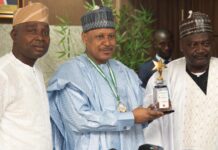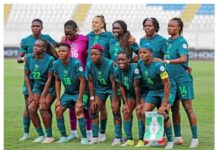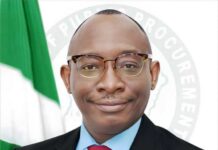Abuja (Budget and National Planning Report) – The Minister of Budget and National Planning, Udoma Udo Udoma has advised that the current economic crisis in the country should be seen as an opportunity for Nigeria to make major structural changes needed to change the country’s economy for good.
He said this at the conference of the Nigeria Economic Society (NES) in Abuja recently; he opined that this opportunity should be used to implement reforms needed to unlock the economic potentials of the non-oil and high-employment sectors and subsequently achieve sustainable inclusive growth that will ensure that majority of Nigerians become more productive.
The Minister believes that with the cooperation and collaboration of relevant stakeholders, government can change the Nigerian economy for good. “Achieving the objective is a task the present administration has set for itself, and is determined to achieve.”
“We must use this crisis to introduce measures that will truly diversify the Nigerian economy by ensuring that the non-oil sector generates enough foreign currency earnings to drive the economy even without any crude oil earnings; government must use this crisis as an opportunity to promote broader macroeconomic and structural reform so as to mitigate supply-side constraints and diversify the productive and revenue base of the economy,” he said.
The Minister revealed that government’s plan to achieve all these are contained in the Strategic Implementation Plan which will be expanded into a more comprehensive medium and long term plan as a successor plan to the country’s vision 20:2020.
He said that the federal government has been working with the state governments through the National Economic Council to engender alignment of policies; he revealed that retreats have been organized with them to share ideas, information and knowledge; private sectors, academic and professional bodies, the civil society and stakeholders are also not left out in this retreat.
As part of efforts in this direction, he pointed out that the government is currently collaborating with private sectors to launch a “Made in Nigeria” campaign, with the intension of encouraging quality production and massive consumption of “Made in Nigeria” goods and services.
He urged us to encourage the branding of Nigerian products by self-regulatory industry bodies such as wine makers in France; he said that ‘Made in Nigeria’ should become a badge of quality, as the quality of our goods and services improve, both local and international demand for them will increase.
He said high local demand will give Nigerian producers the platform to explore the export market, he opined that there is no doubt that one of the fastest routes to grow the economy and to create jobs for the teeming population is by pursuing export-led growth; he said this strategy also holds high promise for adding to our foreign reserves and further stabilizing the naira.
“We are convinced that this is capable of delivering desired results and potentials for exports to increase foreign exchange earnings and shore up foreign reserves”, he added.
The Minister explained that final decision has not been taken on the sale of any asset and that the government was still open to contributions and is looking forward to receiving the recommendations from the conference as to how government can deepen and broaden the reforms being embarked upon aimed at restructuring the Nigerian economy and changing it for good.
While speaking after being conferred with the Fellowship of the NES, the President of African Development Bank (AfDB), Akinwumi Adesina (Dr) dispelled the speculation that Nigeria is in debt crisis, insisting that Nigeria still remains the strongest economy in Africa.
He said that Nigeria is a very resilient country and has a very resilient economy, which is why the AfDB will continue to support its growth aspirations; he applauded President Muhammadu Buhari for securing the country’s borders.
Dr. Adesina said revamping the economy as it is presently, would require tough decisions and therefore challenged the economists to provide evidence-based data to support government in its efforts to grow the economy.
He pledged the bank’s support for rehabilitation efforts in the North East of Nigeria and an additional support for internally displaced persons (IDPs) in the region.





